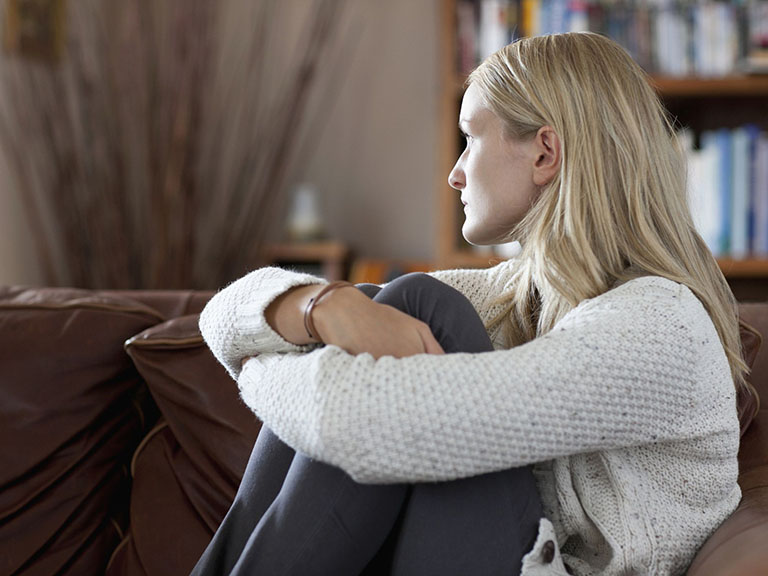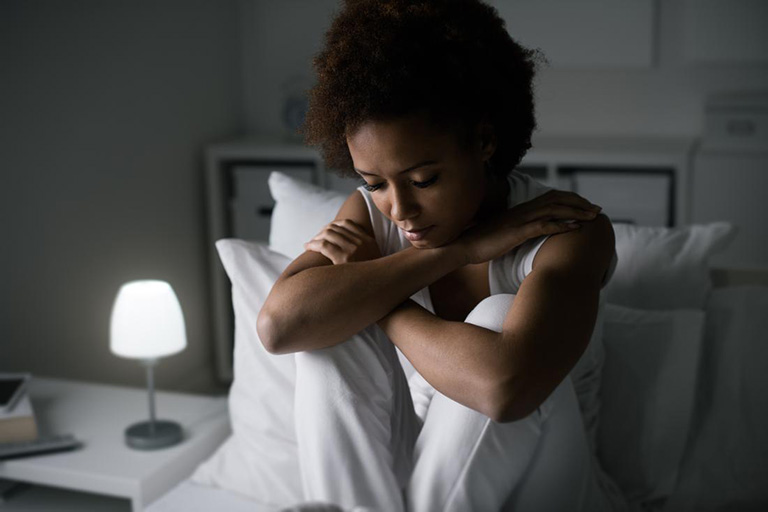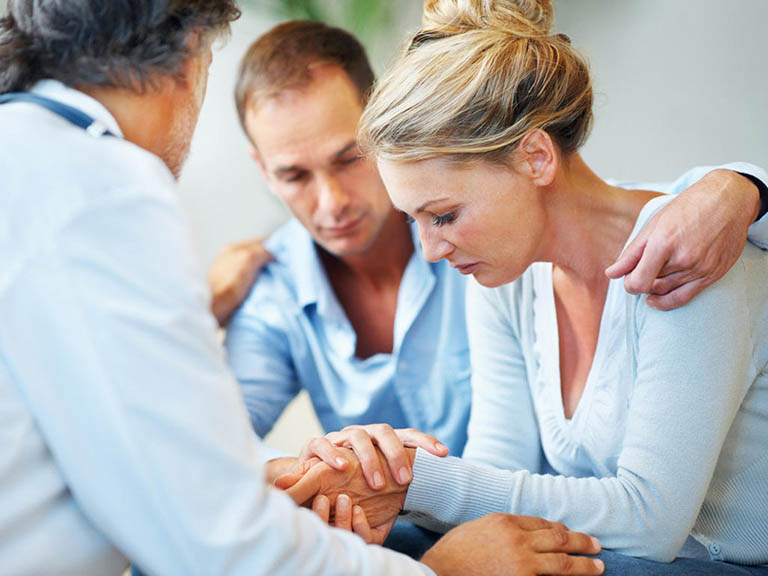Pregnancy and childbirth is one of the noble duties of every woman. Therefore, when facing the pain of miscarriage, many women cannot control their emotions, easily leading to depression. Based on statistics in our country, the rate of depression after miscarriage is very high and is showing signs of increasing significantly.

Depression after miscarriage makes the patient always sad, depressed, and moody
In fact, about 10 to 20% of women have a miscarriage out of all pregnancies. Miscarriage is the sudden loss of pregnancy that occurs before the 20th week. Most miscarriages occur in the first 3 months of pregnancy.
Experts say that miscarriage will often happen naturally because at this time the fetus will not be able to develop normally inside the womb. Until now, it is still not possible to pinpoint the exact cause of miscarriages. However, scientists believe that miscarriages are related to genetic factors or fetal chromosomes.
Specifically, some health problems of the mother can affect and cause miscarriage such as:
- Hormone problems, such as adrenal or thyroid gland problems.
- Diabetes is not well controlled or is not diagnosed and treated.
- Pregnant women with lupus or some other immune disorder.
- During pregnancy infected with viruses, bacteria, can be infected by sexual transmission
For women who are in a state of joy when they are mothers, miscarriage is one of the great pain and loss. Even though the pregnancy is over, they can still feel and relive moments of strong connection with their baby. Therefore, it is difficult to avoid feelings of sadness, despair, guilt, self-blame.
Signs of depression after miscarriage
After a miscarriage, most women fall into a state of grief, depression, and extreme despair. These are considered very normal emotions when receiving news that your child is no longer there. However, in some cases, this grief persists and leads to depression.
Depression after a miscarriage is a fairly common condition that can affect any woman. Depression is considered a mental disorder characterized by prolonged sadness and distress and manifests itself in varying degrees. Not only that, depression can also make patients gradually lose interest in life, they become closed and do not want to communicate or do any work.
Depression after miscarriage, if not detected and prevented in time, will greatly affect the overall health of the patient. Some more serious cases can also cause dangerous consequences such as self-harm, suicidal thoughts.

Patients with depression always feel miserable, tired, exhausted
Therefore, families and loved ones should learn and understand some of the symptoms of depression so that they can timely detect and intervene properly. Here are some common symptoms of post-miscarriage depression:
- Always feel bored, tired, empty mind, vague.
- Sensitive, excitable, angry, irrationally irritable.
- Loss of interest in most of the events and activities happening around, even those that were once loved.
- Sleep disorders, insomnia, sleep not deeply, tossing for many hours can’t sleep, or having nightmares or there are cases of restless sleep, continuous drowsiness.
- Feeling tired, sluggish, lack of energy and do not want to do anything.
- Loss of appetite, poor appetite, often skipping meals or eating too much, eating out of control.
- Feelings of guilt, feeling worthless, blaming yourself.
- Always in a state of anxiety, insecurity, restlessness for no apparent reason.
- Loss of concentration, impaired attention, difficulty making choices and decisions on a daily basis.
- Memory impairment, forgetfulness, confusion.
- Thoughts of death and suicidal thoughts, attempted suicide.
- At the same time, the patient may also have some physical symptoms such as body aches, headache, chest tightness, heart palpitations, some digestive problems, stomach problems, etc.
A person who is diagnosed with depression after a miscarriage will have at least 5 of the above symptoms and they show up continuously every day, lasting at least 2 weeks. Often, symptoms of depression after a miscarriage can appear as soon as the news of a pregnancy loss is received.
At this time, the manifestation of the disease is also the most serious and requires prompt intervention. However, over time, the symptoms of the disease will gradually subside and be well controlled.
According to information from a scientific study, the rate of depression in people who have just had a miscarriage will gradually decrease after about 1 year. After that time, the rates of depression in women after a miscarriage and women without a miscarriage will be about the same.
It is quite surprising that depression after a miscarriage is not only likely to occur in women. Research has found that even men can fall into depression after their wife or lover has a miscarriage. However, they will tend to recover better mental health than women.
Reasons why women are prone to depression after miscarriage
In fact, miscarriage is something that no one wants and is difficult to predict. Most of us, when faced with the news of the loss of our child, feel immense pain and sadness. Especially mothers, they can feel the close connection between themselves and their children.
That’s why there have been many cases of falling into a state of depression after miscarriage. The mother’s spirit is depleted, becoming distressed, desperate and sad. Regardless of the cause of the miscarriage, the pain and suffering still cannot be avoided.

The pain of losing a baby is so great that women are more likely to fall into depression after miscarriage
According to statistics, women who experience the pain of miscarriage are more likely to fall into a state of depression. Specifically, some of the reasons include:
- The pain of losing a child is so great that the mother feels depressed and sad for a long time, from which her physical and mental health gradually become depleted.
- After a miscarriage, the hormone levels inside the mother’s body will change suddenly, this is also one of the big reasons why many people suffer from depression after miscarriage.
- Due to guilt, self-blame and thinking that I am really worthless, I lost my child. These emotions are persistent and long-lasting, making many people prone to depression and anxiety.
- In some cases after a miscarriage, women have to constantly face criticism, scolding, criticism from relatives and people around.
- Conflicts, arguments, conflicts with husband or family members.
- Due to the indifference, indifference, and coldness of their spouses and loved ones, they feel lonely, lost and hurt.
- After a miscarriage, a woman’s body has to face a lot of changes inside, at this time they are completely unstable both mentally and physically, so they are easily affected by the impact factors. by the environment.
- Subjects at high risk of depression after miscarriage such as infertile women who have applied many methods but have difficulty conceiving children, have had multiple miscarriages, women with some dangerous diseases, women Women with a history of depression before pregnancy
Experts say that depression after a miscarriage can have many different causes. Sometimes it appears due to the patient’s own guilt, sadness, and self-reproach, but also in other cases due to the objective effects of criticism, jealousy and indifference of the people around.
Even if depression after a miscarriage occurs for any reason, it needs to be detected early and intervened in time to limit potentially dangerous consequences. Being able to diagnose and treat early will help patients quickly recover their health and gradually stabilize to return to a normal life rhythm.
How to overcome depression after miscarriage?
If after a miscarriage, the above symptoms continue to appear and persist, then you need to consider seeing a specialist for a specific examination and diagnosis. Mental health doctors will conduct a general physical exam and run some specialized tests to assess the specifics of the illness.
Depending on each patient’s condition, the doctor will recommend the most appropriate and effective treatment plan for each patient. Usually, if the symptoms of depression are mild, the doctor will recommend and advise some ways to improve at home or in combination with psychotherapy.
For more serious cases, depressive symptoms that seriously affect the patient’s health and daily life, will be considered for treatment with some anti-depressant drugs. The process of overcoming depression after a miscarriage needs to maintain a certain period of time, so the patient needs to be very patient and apply the treatment methods of a specialist doctor.
Specific methods are often indicated to treat patients with depression after pregnancy such as:
1. Change to healthier living habits
The best way to overcome depression after a miscarriage is to quickly adjust your daily living, resting and eating habits. For mild cases, just paying more attention to the exercise regimen, taking time to relax, rest and supplement the necessary nutrients is enough to reverse the disease symptoms.

Women after miscarriage should eat healthy, avoid skipping meals
Specifically, there are some measures that you should take immediately, such as:
- After a miscarriage, the body will not be able to stabilize immediately. However, you should not just lie down forever, but need to exercise and have a suitable exercise regimen. A healthy exercise every day will help improve physical health, and at the same time stimulate the production of more serotonin hormones, creating feelings of joy and happiness, repelling feelings of anxiety, sadness, and depression.
- In order for the body to recover well mentally and physically, patients need to spend more time resting and relaxing. If possible, temporarily put aside some work to take care of and love yourself more. However, you also need to plan specifically for the time of the day, avoid lying in one place or working too hard.
- Nutrition is also a necessary and important factor for people with depression to regain good health. Therefore, patients need to pay attention to choose nutritious foods, rich in vitamins and minerals such as green vegetables, fatty fish, milk, and fruits to improve their health from the inside.
- More than 80% of depression cases fall into a state of insomnia, not sleeping deeply. To overcome this situation, you need to try to build a habit of sleeping before 23 o’clock and sleeping 7 to 8 hours a day. If you find it difficult to sleep, you can try to apply simple tips such as meditating, soaking your feet in warm water, using aromatherapy, listening to music, etc.
- Actively share and confide in loved ones, seek help when feeling tired, stuck and hopeless. Being able to express your inner feelings will help you feel more comfortable and at ease. At the same time, the people next to you can give you more useful advice, helping you to relieve the worries in your heart.
- If you’re bored, try finding a fun activity or simply try something you’ve never experienced before. For example, cooking, taking care of ornamental plants, raising pets, composing music, reading books, drawing pictures, ….
2. Psychotherapy
Psychotherapy is a method of direct conversation and exchange between psychologists and patients. Through face-to-face meetings, experts will untie the knots in the patient’s heart, helping them see the problem in a more positive and optimistic way.
This is also considered one of the most effective and safe methods of treating depression after pregnancy today. Also because this therapy has no drug intervention, it is safe and does not cause side effects or leave any complications.
Depending on the condition and cause of each person’s illness, psychologists will choose the most appropriate treatment techniques. With their professional techniques, experts will help patients feel comfortable, stabilize their psychological state and gradually adjust their wrong thoughts and behaviors in the right direction.

Psychotherapy will help patients relieve and balance their mood better
In addition, after the patient has gradually stabilized in psychological state, and the negative thoughts have been significantly reduced, the specialist will guide them on how to control their emotions well. In addition, patients are also taught the necessary skills to cope with difficult and distressing situations in life to prevent the risk of disease recurrence.
Often, for cases of depression after a miscarriage, the specialist will encourage family members to participate in family therapy. This will help members better understand this dangerous disease and receive specific instructions on how to effectively care for and support the patient.
3. Treat depression with medication
Depression after a miscarriage is often confused with the usual state of grief, depression, and despair. Therefore, most of the cases that seek treatment have developed into a serious stage, the disease becomes more complicated and difficult to treat.
As a result, mental health practitioners will often consider prescribing some supportive medication. Although antidepressants cannot treat the root cause of the disease, they are very effective in controlling and reducing dangerous symptoms, preventing the risk of suicide in patients.
However, most antidepressants used today have the risk of causing unwanted side effects such as dizziness, dry mouth, headache, dizziness, impaired sexual function, etc. Therefore, when prescribed to use drugs, patients need to be really careful and strictly comply with the requirements of experts and doctors.
Patients absolutely must not buy drugs to use or arbitrarily change the dosage of drugs. Especially do not stop using the drug suddenly to avoid causing dangerous consequences that affect life. If you experience any unusual symptoms during use, you should immediately notify your doctor for prompt treatment.
What should I do to avoid depression after a miscarriage?
As shared above, after a miscarriage many women easily fall into a state of sadness, depression and despair. If these negative emotions are not handled well, it can easily lead to depression. Therefore, in order to avoid the risk of having this dangerous mental disorder, you should refer to some effective ways as follows:

Families should take time to care so that women do not feel lonely after miscarriage
1. Emotional balance
After a miscarriage, women will have to constantly face a series of negative emotions. If they do not know how to balance effectively, it can easily trigger symptoms of depression, affecting their life and health.
Therefore, the best way to prevent depression after a miscarriage is to be open and comfortable with those around you. Let your loved one understand your torn feelings and feel free to express the bad things you’re going through.
If you want to cry, cry out loud. Experts say that crying is also one of the effective “medicines” to help you relieve and balance your psychological state better. After crying, you will feel more comfortable and relieved, then move on to what you have to do.
Also, try to find yourself a suitable relaxing activity to avoid burying your head in the bad emotions that are happening. Try stepping outside to breathe in the fresh air, admire the beautiful natural scenery or have appointments with friends and relatives to dispel the hurt and suffering.
2. Take time to rest
This is essential if you don’t want to deal with depression after a miscarriage. Because after losing a fetus, your body will be short of a large amount of blood, making you easy to feel tired and weak. Therefore, take a few days or a week to rest and relax, and help your health recover better.
Pay attention to your diet, add nutritious foods and limit hot spicy foods, stimulate the digestive system or upset emotions such as alcohol, sugar, caffeine. No matter how sad or tired you are, you still need to maintain healthy eating habits, avoid skipping meals.
At the same time, allow yourself to rest, relax and enjoy life. However, don’t stay in bed forever or lock yourself in your room. Go out and look at everything around, get the sun to increase the body’s production of serotonin – a neurotransmitter that works to prevent depression effectively.
Besides, try to monitor your health status after miscarriage. If the symptoms of insomnia, fatigue, headaches keep appearing and persist even though you have a good care regimen, see your doctor for a specific examination. This will help you detect unusual problems in time and feel more secure about your current health status.
3. Put hope in the future
When having a miscarriage, every woman must feel extremely stuck and hopeless. They will start to fear about the chances of getting pregnant in the future and gradually fall into a state of depression. However, in reality, many women after miscarriage can still have a successful pregnancy if they know how to take good care of themselves.
Let’s hope for the future, think of good and new things that will help you quickly dispel the pain of the past. According to a survey conducted on 1000 couples after a miscarriage, 765 couples got pregnant again after only 3 months and the remaining 233 couples also had children after a longer period of time.
However, pregnancy needs to happen naturally, you should not be too pressured and try to force yourself to have children again immediately. Experts say that the more pressure and stress, the lower the pregnancy rate. Therefore, both husband and wife should be prepared mentally and physically so that they can comfortably welcome their next child.
The above article has given some useful information about depression after miscarriage. As soon as you notice the warning signs, you should quickly see a specialist for a specific examination and diagnosis, thereby giving effective remedial measures, minimizing the possible serious consequences happen.










